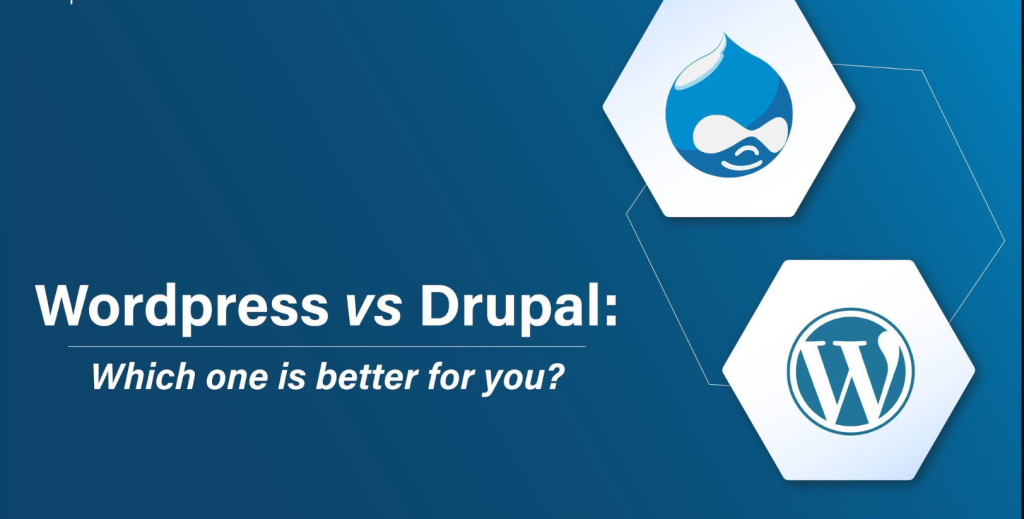WordPress and Drupal
Choosing the right Content Management System (CMS) is crucial for businesses aiming to establish a strong online presence. With numerous options available, it often boils down to WordPress and Drupal, two of the most popular CMS platforms on the market. In this article, we’ll delve into the strengths and weaknesses of both WordPress and Drupal, helping you make an informed decision based on your business needs.

Table of Contents
- WordPress: The Power of Simplicity
- Why WordPress might be the right choice for your business
- Drupal: The Flexibility of Customization
- Why Drupal might be the right fit for your business
- Choosing the Right CMS for Your Business
- Conclusion
WordPress: The Power of Simplicity
WordPress is a versatile and widely-used Content Management System (CMS) renowned for its simplicity and user-friendliness. Originally launched as a blogging platform in 2003, WordPress has evolved into a comprehensive CMS powering over 40% of websites on the internet.
At its core, WordPress offers a straightforward interface that allows users to create, manage, and update content with ease. Its intuitive dashboard makes tasks such as adding new pages, writing blog posts, and uploading media as simple as using a word processor. This accessibility makes WordPress an ideal choice for individuals, small businesses, and large enterprises alike, enabling users with varying levels of technical expertise to build and maintain professional websites.
One of the key strengths of WordPress lies in its extensive ecosystem of themes and plugins. Users can choose from thousands of free and premium themes to customize the look and feel of their websites, while plugins add functionality for everything from e-commerce and social media integration to search engine optimization and security enhancements. This flexibility allows users to tailor their WordPress sites to suit their specific needs and goals without requiring advanced coding skills.
Why WordPress might be the right choice for your business

- Ease of Use: WordPress is known for its user-friendly interface, making it accessible to users with varying levels of technical expertise. Whether you’re a beginner or an experienced developer, WordPress’s intuitive dashboard and straightforward content management system make it easy to create, edit, and manage content without requiring extensive coding knowledge.
- Quick Setup: With WordPress, you can get your website up and running quickly. The platform offers a wide range of pre-designed themes and templates, allowing you to choose a design that suits your business and customize it to your liking. Additionally, the extensive library of plugins provides added functionality for various needs, such as e-commerce, SEO, and social media integration, further streamlining the setup process.
- Flexibility and Scalability: WordPress is highly flexible and scalable, making it suitable for businesses of all sizes and industries. Whether you’re a small startup or a large enterprise, WordPress can accommodate your needs and grow with your business. With thousands of themes and plugins available, you can customize your website to meet your specific requirements and scale it as your business expands.
- SEO-Friendly: WordPress is inherently SEO-friendly, with features such as customizable permalinks, sitemaps, and SEO plugins like Yoast SEO that help optimize your content for search engines. This makes it easier for your target audience to find your website through organic search, driving more traffic and potential customers to your business.
- Cost-Effectiveness: WordPress itself is free to use, making it a cost-effective solution for businesses of all sizes. While you may incur expenses for premium themes, plugins, and hosting services, the overall investment is typically lower compared to custom-built websites or proprietary CMS platforms. Additionally, the extensive community support and resources available for WordPress can help you save on development and maintenance costs.
- Community Support and Resources: WordPress boasts a vast and active community of developers, designers, and users who contribute to its ongoing development and provide support through forums, documentation, tutorials, and meetups. Whether you need help troubleshooting an issue, learning how to use a new feature, or finding inspiration for your website design, you can rely on the WordPress community to provide assistance and resources whenever needed.
Drupal: The Flexibility of Customization
Drupal, often referred to as a “content management framework,” is a powerful open-source Content Management System (CMS) renowned for its unparalleled flexibility and customization capabilities. It empowers users to create highly tailored websites, web applications, and digital experiences.
Drupal’s flexibility of customization stems from its modular architecture, custom content types and fields, flexible theming system, API-first approach, enterprise-grade features, and active community support. Whether you’re building a simple website, a complex web application, or a multi-channel digital experience, Drupal provides the tools and capabilities to tailor your digital presence to your exact specifications and achieve your business objectives effectively.
Why Drupal might be the right fit for your business

- Scalability: Drupal is designed to handle high-traffic websites with complex data structures, making it suitable for enterprise-level projects. Its modular architecture allows for extensive customization and scalability, ensuring your website can grow alongside your business.
- Security: Security is a top priority for Drupal, with regular security updates and a dedicated security team. Its robust permission system and built-in security features make it a trusted choice for organizations handling sensitive data or operating in regulated industries.
- Content Modeling: Drupal excels in content modeling, allowing users to define custom content types, fields, and relationships. This level of granularity is invaluable for organizations with specific content requirements or complex data structures.
- Community and Support: While smaller than WordPress, the Drupal community is highly knowledgeable and supportive. With active forums, user groups, and meetups, you can tap into a wealth of expertise to address any challenges you may encounter.
Choosing the Right CMS for Your Business
When deciding between WordPress and Drupal, it’s essential to consider your business’s specific needs and priorities. Here are some key factors to keep in mind:

- Ease of Use vs. Flexibility: If you prioritize ease of use and quick setup, WordPress is likely the better option. However, if you require extensive customization and scalability, Drupal might be more suitable, albeit with a steeper learning curve.
- Content Requirements: Consider the type of content you’ll be publishing and whether your CMS needs to support complex data structures or custom content types. Drupal’s robust content modeling capabilities make it ideal for organizations with diverse content needs.
- Budget: While both WordPress and Drupal are open-source, consider the potential costs associated with themes, plugins, and development. WordPress may be more cost-effective upfront, but Drupal’s scalability could offer long-term savings for larger enterprises.
- Security and Compliance: If your business operates in a highly regulated industry or handles sensitive data, prioritize security features and compliance standards. Both WordPress and Drupal offer strong security measures, but Drupal’s focus on enterprise-level security may be advantageous in certain scenarios.
Conclusion
WordPress and Drupal are both powerful CMS platforms, each with its own strengths and weaknesses. Ultimately, the right choice depends on your business’s specific requirements, budget, and long-term goals. Whether you prioritize simplicity and ease of use or scalability and customization, both WordPress and Drupal offer robust solutions to help you build and manage your online presence effectively. By carefully evaluating your options and considering the factors outlined in this article, you can confidently choose the CMS that best aligns with your business objectives.



